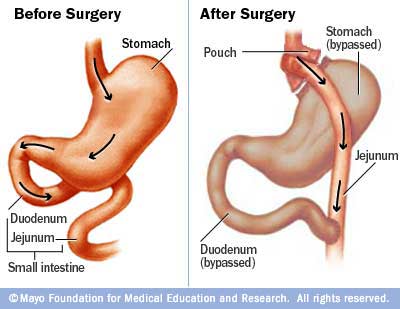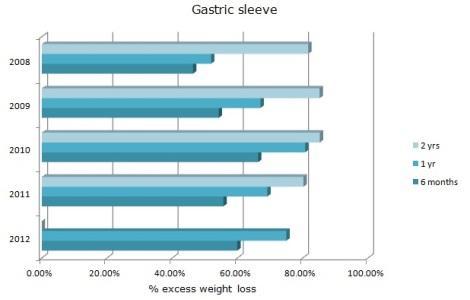Can we Bypass the Gastric Bypass Surgery to help with Diabetes remission?
 Why is it that even before patients start dropping in weight, Gastric bypass surgery helps reduce symptoms of type 2 diabetes? Doctors are focusing on diabetes patients’ small intestines to help reduce the amount of extra glucose.
Why is it that even before patients start dropping in weight, Gastric bypass surgery helps reduce symptoms of type 2 diabetes? Doctors are focusing on diabetes patients’ small intestines to help reduce the amount of extra glucose.
“What we found is that the secret for the cure of diabetes after gastric bypass surgery lies in the intestine,” says principal investigator at the Division of Endocrinology at Children’s Hospital Boston and Boston Medical School, Dr. Nicholas Stylopoulos, in a Healthline interview. “The key message is that after gastric bypass the intestine becomes the most important tissue for glucose use and this decreases blood sugar levels.”
Doctors feel confident that they can find a way to simulate the methods that Gastric bypass surgery provide for improvements to the type 2 diabetics without doing the actual surgery.
Gastric Bypass Surgery: The answer lies in the small intestine
GLUT-1 assists the body in using glucose. The small intestine creates this molecule after undergoing gastric bypass, a popular weight loss surgery.
During an interview with Healthline, A fellow researcher of Stylopoulos, Dr. Erini Nestoridi, says “The quite amazing thing is that this is not present normally in the small intestine of adults, but only in the fetus, this happens most likely because the intestine has to work harder to do its job, for example to absorb the nutrients or move the food further down. Also, it may be that the mechanical stress of ‘dumping’ the food directly to the intestine, since the stomach is bypassed, contributes to these changes.”
According to research, gastric bypass surgery has helped clear up symptoms of diabetes before weight loss occurs, despite weight loss having a positive correlation with recovering from diabetes. According to the United States’ CDC, diabetes affects more than 8% of the population. That is around 26,000,000 people. This disease can do further harm by causing damage to nerves, kidneys, eyes, and increased risk of stroke and heart attacks.
“The problem becomes even bigger if one considers that type 2 diabetes rates will only increase because of the increased obesity rates, and since obesity and type 2 diabetes are linked,” said Stylopoulos. “And to add another scary thing, the childhood obesity rates have tripled since 1980s, so all these complications will start appearing in younger people.”
The initial research Stylopoulos had done was on rats. As to whether or not GLUT-1 appears in humans who have gastric bypass surgery, still remains to be seen. Afterwards, the team will check whether a non-surgical approach on the animals will simulate the effects of gastric bypass. Their objective is to create the small intestine into a storage for the bloodstream to discard glucose. This would help lower the risk of diabetic complications by lowering the blood sugar levels.
“With more research, we hope that we can find ways to, as we say, bypass the bypass,” says Stylopoulos. “This mechanism we found is very promising because unlike other organs, such as the brain for example, intestines are easily accessible, and the life of those cells is only about two days, so we can easily study and manipulate these cells without having long-term problems.”
Professor Charles Mobbs told Healthline that the new research could make the medical community more inclined to accept gastric bypass surgery to fight against diabetes, regardless of the person’s weight. The professor of neuroscience, endocrinology, and geriatrics at the Icahn School of Medicine at Mount Sinai Medical Center in New York says that more data is required to understand why gastric bypass surgery makes the small intestine create GLUT-1
“It may be possible to pharmacologically mimic the effect of the undigested food to induce glucose metabolism in the intestine (which of course is highly accessible to oral drugs) independent of surgery,”said Professor Mobbs. “This could lead to a revolution in the treatment of diabetes, possibly including type 1 as well as type 2.”
Treating diabetes or weight loss through Gastric bypass surgery is unfortunately out of reach for many Americans. The average cost for procedures like these come out to $20,000 out of pocket. This is why the #1 provider for weight loss surgery has been Mexico. Click Here to see how you can get your bariatric procedure at CHIPSA hospital in Mexico and also get Free Roundtrip Airfare, Airport Pickup and Accommodations.



























